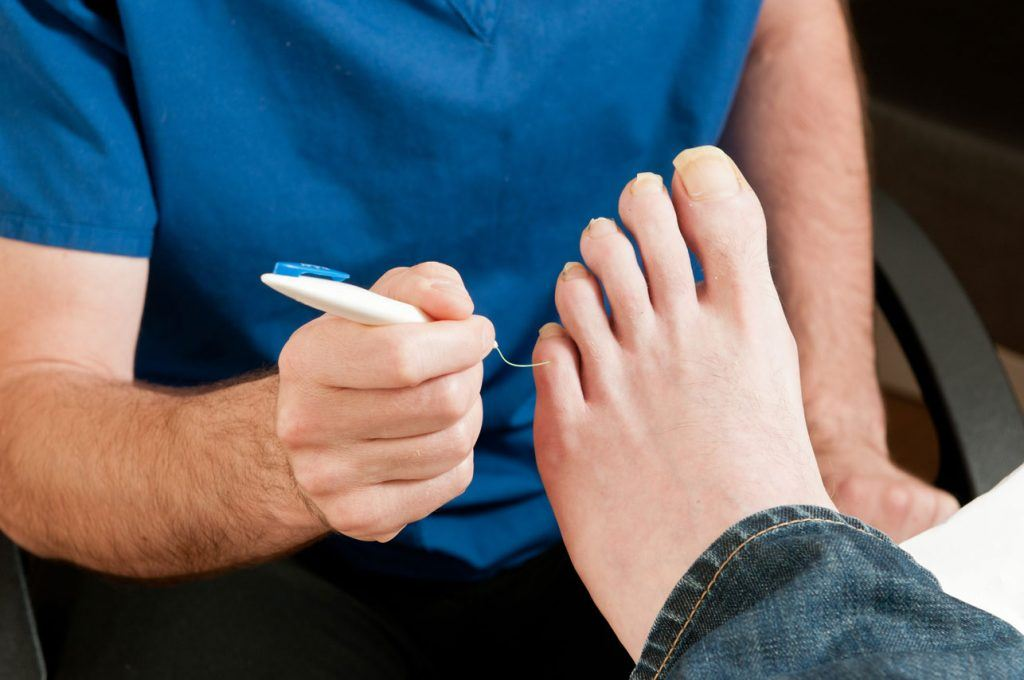How do I train for a career in podiatry?
Find out more below.

School leavers entering podiatry
If you are just leaving school and thinking about a career, podiatry offers almost certain employment and endless opportunities.
As a school leaver, there are a few different ways in which you can study and qualify as a podiatrist.
Find out more

The undergraduate route
To become a qualified podiatrist in the UK, you need to complete an undergraduate degree that has been approved by the Health and Care Professions Council.Degree courses typically span three to four years and equip students with the necessary knowledge and practical skills to practise as a podiatrist.
Find out more

Podiatry as a second career
Many people entering podiatry do so following successful careers elsewhere, such as in the armed forces or as other allied health professionals. Many bring highly transferable skills and experience to their new profession.There are many benefits to choosing podiatry as a second career.
Find out more

The apprenticeship route
Apprenticeships are paid jobs that allow you to learn and work at the same time.In recent years the apprenticeship route has been a popular way to enter the profession, learning alongside more experienced members of our profession.
Find out more

International entry into UK podiatry
In recent years, international recruitment has proved to be a successful means of filling the gaps in the UK podiatry workforce. Recruits from outside the UK often bring their own knowlege, skills and expertise to benefit the existing workforce and to enhance the level of care we offer to our patients.Find out more

Support worker pathways
If you are already working in a podiatric setting as a support worker - maybe as a foot care assistant, foot health practitioner, or assistant practitioner - there are pathways available to you to become an HCPC registered podiatrist.
Find out more here

Podiatry after professional sport
A career in professional sports brings with it skills in teamwork, communication, discipline, and leadership, as well as an understanding of anatomy and body movement. Find out how you can transfer your skills to a new career in podiatry.
Find out more
What is a podiatrist?
Podiatrists are highly skilled healthcare professionals trained to assess, diagnose, prevent, treat, and rehabilitate complications of the foot and lower limb.
Career opportunities for podiatrists

Podiatry within the NHS
Working as a podiatrist within the NHS means you'll be helping people with a range of conditions and helping to keep patients active and pain-free.You will also have the opportunity to work with other healthcare professionals such as nurses, physiotherapists, dieticians and GPs.
Find out more

Independent practice
Prefer to be your own boss and find the work/life balance that works for you? Then think about setting up in private practice, whether clinic-based or as a domiciliary practitioner.Find out more

Podiatric surgery
Podiatric surgeons are highly skilled clinicians who work with the surgical management of the bones, joints and soft tissues of the foot and associated structures.
Podiatric surgeons undertake rigorous academic and practical study to qualify to perform foot and ankle surgery.
Find out more

Research
Podiatry is an evolving profession, constantly researching and developing new ways of working and better solutions for our patients. If you loved the academic side of your career path, then there are career opportunities in research available to you.
Where to study and funding
How much can I earn once I am qualified?
Putting a number to it is not that easy but here are a few examples.
Working in the NHS
- Podiatrist (band 5) £28,407 to £34,581
- Specialist podiatrist (band 6) £35,392 to £42,618
- Team leader, Advanced podiatrist (band 7) £43,742 to £50,056
- Specialist Registrar in Podiatric Surgery or Consultant Podiatrist in Podiatric Medicine (band 8 a – d) £50,952 to £96,376
- Consultant Podiatric Surgeon (band 9) £99,891 to £114,949
Working in Private Practice
- Working in a private practice you can earn around £20,000 – £50,000 per annum
- Owning a successful single chair private practice you can earn around £50,0000 – £250,000
- Owning a successful multi-chair private practice you can earn around £100,000 – £500,000
- Owning a successful multi-site private practice you can earn around £150,000 – £1,000,000+
Source: Prospects: podiatrist job profile: https://www.prospects.ac.uk/job-profiles/podiatrist
Specialist areas of practice
There's a lot more to podiatry than many people realise. Most podiatrists start their professional life working in general clinics. As their career progresses and their clinical skills develop, many identify areas of practice that really interest them and so they steer their career in that direction
|
|
|
Case Studies
Click a box to view the case study
Dan Aston
I had my own glassblowing business for 11 years, where I made my own coloured ranges of glass from paperweights, bowls, vases and wine glasses to trophies for awards and glass jewellery. I also did demonstrations for schools, special needs groups and women institute groups and I taught people to glass blow on one day glassblowing courses.
However recently I had to sell the business and decide on a new career path. I chose a career where I could use my hand skills and people skills and Podiatry was perfect as it contained these attributes. I am a people person and like to help people in all situations. I really enjoy the course and I am finding it fascinating, as well as making new friends.
Sam Alexander
Coming from a family of runners I have stood cheering at many marathons. Watching the runners cramping up and the painful limp to reach the finish definitely sparked my interest in how our legs and feet function and what can go wrong. This interest is what led me to train for a career in Podiatry.
I am really enjoying my time at university and the course has highlighted so many other aspects of Podiatry that I had not considered before. It has been really exciting taking on all of this new knowledge and even though there is a lot of it, the course is well structured and is broken down into manageable chunks. Clinic can be a challenge but it is my favourite aspect of the course. I am looking forward to the future and all of the opportunities that this career will provide.
Virginia Moore
As a mature student and a mother of two I never thought it would be possible to attend university to study Podiatry. Before I started the course I was working in a clinic alongside a Podiatrist where I became interested in the profession. I realised it was a career for me as I enjoy interacting with people and learning about anatomy and physiology.
Previous to starting the course I had to do an Access to Higher Education Diploma in Science as I did not have the qualifications to go to university. I found the Access course extremely helpful as it provided me with the foundations I needed for the degree. The Podiatry course is academically challenging which I enjoy, and working alongside Podiatrists and other healthcare professionals on clinical placements allows me to put theory into practice.
Contact us
*Standard contact hours. These hours are subject to change due to bank holidays and festive periods
